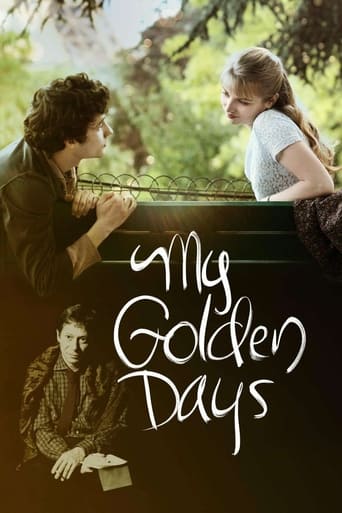



not horrible nor great
It's no definitive masterpiece but it's damn close.
View MoreInstead, you get a movie that's enjoyable enough, but leaves you feeling like it could have been much, much more.
View MoreBy the time the dramatic fireworks start popping off, each one feels earned.
View MoreIn this film Esther and Paul write letters to each other. They often speak their mind of others, and always profess their feelings for each other. Here are my two favorite correspondences. "I can offer you only my lightness. I admire your every smile, your every rebuff. I realize my offer is flimsy. You make me laugh. Furious, unpleasant, exquisite: you always make me laugh. I love you only with lightness, yet I'm so heavy. Gloomy, as you all said at the party. You were right. You were right. I don't want you to wait. Don't count on me. My life is too austere for that. Paul""Hey Paul. Don't worry. Your remorse gets in your way. I'm simpler. Simply, I'm happy when I see you."Earlier in the movie:"Esther, you exist so much. Like a mountain. My existence, the world around me, seems aquiver. So I'm reassured. I don't care whether you want me. Your existence proves I'm not stuck in a dream. In you, at your feet, I place my faith."
View MoreArnaud Desplechin first introduced his protagonists, the young Paul Dédalus and his girlfriend Esther, way back in 1996 in his highly successful "My Sex Life... or How I Got into an Argument." Now he brings Dedalus (Mathieu Amalric) back again as an adult, just having returned from his work as an anthropologist in Tajikistan. The film is divided into three segments, with an adult Paul reminiscing first about his childhood, chronicling an abusive father and depressed mother, who eventually commits suicide. There's not much to the first segment but the second proves to be the most interesting. After being detained by government security forces, Paul explains why another Paul Dedalus, with origins in Russia, has turned up with his passport.Paul is subjected to an interrogation by a security agent which allows him to explain how he gave up his passport while on a high school trip to Russia so that a Jewish teenager could use it to escape to Israel during the time of anti-Semitic persecutions of Jews in the Soviet Union during the late 80s.But My Golden Days turns from being a suspense thriller to a more conventional coming of age story when the young college student Paul (played convincingly by Quentin Dolmaire), falls for Esther, a high school student who is the same age as Paul's sister, Delphine.After having seen the film a few weeks ago, I had trouble recalling details about Paul and Esther's romance-- so I turned to a few critic's reviews to refresh my memory. Short on plot description, some reviews are content to provide a few amorphous descriptions of the nature of the relationship.Kenneth Turan, writing in the L.A. Times, briefly explains, "We see them playing out the drama of attraction and insecurity, inexorably drawn to each other but having to face the problems different personalities invariably bring to relationships."Peter Travers in Rolling Stone feels there's something quite deep about what happens between Paul and Esther: "Memory gives the movie a formal frame, but Desplechin laces the past with such raw emotion that nothing is hemmed in. Love hurts, that's for sure. And Desplechin makes sure we feel it."Stephanie Zacharek writing in Time Magazine provides a few more details about Paul and Esther's burgeoning romance: "It takes a long time, in this eternal nighttime, for Paul and Esther to connect. Their flirtations are stilted at first, especially since Paul feels threatened by her many suitors, and she doesn't need to lie about their numbers: Young men cluster to her, as Marlene Dietrich sang, like moths around a flame. But ultimately, it's Paul she chooses, and their liaison starts out sweet before wending its way into l'amour fou territory."Frederic and Mary Ann Brussat writing in Spirituality & Practice believe Desplechin is on to something in what they see as a nuanced portrait of the protagonist's motives: "He reveals the delights and the dangers in our idealization of the beloved, our dizzying capacities of infatuation, the primal longings for each other, and the pain and pleasure which this state of romantic arousal engenders. The Brussats perhaps provide the best summary of the third segment. They note that Paul puts Esther on a "pedestal" but still leaves her behind when he goes to Paris for school. There is a sub-plot emphasizing Paul's competence in his chosen field when he convinces a noted anthropology professor to accept him as a student.Later Paul and Esther share intimacies through a series of love letters but their separation leads to the deterioration of their relationship. As the Brussats put it, Esther "begins to fall apart emotionally and he is at a loss for what to do in response." Finally Paul seeks solace with an older woman and never seems to get over Esther's decision to go out with his best friend, Kovalki, with whom Paul meets up at film's end, and is unable to contain his anger towards. Ultimately Desplechin's portrait of a failed adolescent relationship suffers from a lack of gravitas or high stakes. I would contrast this film with Bergman's "Summer With Monika," where a femme fatale destroys the relationship an earnest young man develops with a young woman who is not what she initially appears to be.Esther, on the other hand, is simply a spoiled neurotic and Paul's inability to shed all the misplaced anger from such an earlier time in his development marks Desplechin's narrative as decidedly inconsequential despite all his "innovative" split-screens and entertaining 80s soundtrack.Francophiles will undoubtedly dig all the "passion," but this dyed-in-the-wool American views this more as a generic tale of adolescent loves lost.
View MoreIt is one of the better told love stories I've seen on the screen. It's one of those movies that's about a relationship running it's course from beginning to end. Very similar to movies like 9 Songs and Love 3D, but no where near as sexually graphic. Maybe because the movie is about a now forty five year old Paul reminiscing about when he was nineteen and had an on again off again relationship with sixteen year old, Ester. As the film title suggest, Paul looks back with found (and little obsessive) memories of her.I thought the main characters as well as the supporting cast were people really interesting to look at. though the movie has a nice look to it that adds to the feel, I never fully embraced the period piece this film is, and surprising the Hip hop score did not help one bit.But overall I like it a lot.
View MoreThe main impression I gained about 'My Golden Days' is a bit more care could have been taken in casting the three actors who play the lead character - at least far as looks go. When we first meet him, Paul Dédalus, a French diplomat, is played by Mathieu Amalric, with his distinctive, 'lived-in' face. We then see him as a child played by Antoine Bui - who is facially so similar to Amalric they could be related. But as a young man, Paul is played by the handsome Quentin Dolmaire, who looks nothing like Amalric and Bui. If Bui didn't look so similar to Amalric this aberration wouldn't be so noticeable.But anyway, the story: returning to France after almost a decade abroad, Paul comes to the attention of the intelligence services because someone with the same name and date of birth has been discovered in Australia. As Paul is questioned, we flashback to his childhood living with his lesbian aunt, to an eventful trip to the Soviet Union and to his student life, but most of all we examine his relationship with the captivating Esther, whom he wins over with his pseudo-intellectual gobbledy-gook.Young Paul is that staple of French cinema, the student who spends too much time thinking. Esther is that other overly-used staple, the unhinged woman. This sort-of prequel to director Arnaud Desplechin's 1996 'My Sex Life... or how I got into an Argument' contains nothing that can't be found in hundreds of other French films. But there's good acting all around; Dolmaire and, as Esther, Lou Roy-Collinet are easy on the eye and their cast of supporting characters interesting. If I have any complaint, it's that I would have liked more - or indeed, any - explanation as to why the child Paul disliked his mother so much, and perhaps more screen time for Amalric - he appears several times in-between the flashbacks of the first third of the film, then suddenly disappears for the rest of it; it's quite noticeable. Where did he go?
View More